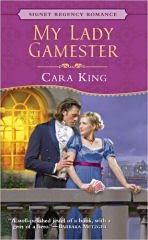The winner of the One Candlelit Christmas anthology is Gwynlyn Mackenzie! Please send your address to riskies@yahoo.com

The winner of the One Candlelit Christmas anthology is Gwynlyn Mackenzie! Please send your address to riskies@yahoo.com


“Louly!”, rief ein in Blau gekleideter Jüngling und stürmte die Stufen herab. Nun erkannte Richard den Bruder Atalantas. “Wie geht’s meiner Louly-Lou?” Der Bursche schwang das Mädchen hoch in die Luft und wirbelte es herum. “Oh, verdammt, wie schwer du bist! Du musst mindestens so viel wiegen wie ein Kriegsschiff, mit hundert Kanonen bestückt und Proviant für zehn Jahre beladen!” Stöhnend gab er vor, unter Loulys Gewicht zu taumeln. “Jetzt weiss ich, du musst der Elefant sein, der heute Abend hier auftreten soll.”
Ächzend und stöhnend sank er auf die Knie. Dann liess er Louly mit einem übertriebenen Seufzer der Erleichterung los, stand schwankend auf und wandte sich zu Atalanta.
“Wie stolz müssen Sie auf Ihren kleinen Elefanten sein, Ms. James…”, spottete er.
“Ja, in der Tat”, bestätigte sie, bückte sich und wischte den Staub von seiner Hose. “Es ist mein grosser Elefant, der mir solche Schwierigkeiten bereitet.”
“Louly!” shouted a youth dressed in blue who was storming down the steps. Now Richard recognized Atalanta’s brother. “How goes it, my Louly-Lou?” The fellow swung the girl high in the air and whirled her around. “Oh, damn, you’re so heavy! You must weigh at least as much as a hundred-cannon warship loaded with ten years’ provisions!” Groaning, he pretended to reel under Louly’s weight. “Now I know, you must be the elephant that’s going to appear here tonight.”
Moaning and groaning, he sank to his knees. Then he let go Louly with an excessive sigh of relief, bounced up and turned to Atalanta.
“How proud you must be of your little elephant, Miss James,” he teased.
“Yes, indeed,” she confirmed, bending down and wiping the dust off his trousers. “It is my big elephant which causes such difficulties for me.”
“Louly!” called the blue-coated lad who bounded down the wide flight of steps toward them. Stoke recognized Atalanta’s brother Tom as he leapt down the last few steps and embraced Louly in a great bear-hug. “How’s my Louly-Lou? How is my plum duff?” The lad lifted Louly off her feet and whirled her around. “Oh crikey, you’re heavy! You must be big as a hundred-gun man o’ war with all its provisions on board.” Tom pretended to stagger under Louly’s weight. “I know! You must be the elephant I’ve come to see.”
After making a great show of being brought to his knees, Tom released Louly with an exaggerated sigh of relief. He bounced back to his feet, and turned to look at Atalanta. “You must be so proud of your little elephant, Miss James.”
Atalanta leaned over to brush the dirt off of the knees of Tom’s trousers. “Yes indeed. It’s my big elephant who causes all the trouble.”
 If anyone doubts that I am truly obsessive, let me lay those doubts to rest.
If anyone doubts that I am truly obsessive, let me lay those doubts to rest.
I obtained a German-translation copy of MY LADY GAMESTER (published by Cora under the title “Höchster Einsatz: Liebe”, which means approximately “The Greatest Gamble: Love”) and I’ve been delightedly comparing the German translation with the English original.
Total fun!
I had heard rumors, by the way, that Cora translations often were much shorter than the originals, and changed rather a lot. I only know this one translation, of course, but it seems pretty darn close to my original. Small bits are cut out — it’s been tightened, basically, and moves a bit more quickly — but the biggest change I can see is that the hero, who (in my version) is always referred to as Stoke (his title) in passages from his point of view, is in the German narration always called Richard.
And now, to prove my true obsessiveness: here’s a passage in German (the translation is by Vera Möbius, and if I ever meet her I’ll buy her a box of chocolates), followed by a comparison of the original, and my back-translation of the translation…
Als ein gellender Schrei ertönte, griff Richard unwillkürlich an seine Hüfte, aber dort hing natürlich kein Degen. Und er brauchte auch gar keine Waffe.
“Louly!”, rief ein in Blau gekleideter Jüngling und stürmte die Stufen herab. Nun erkannte Richard den Bruder Atalantas. “Wie geht’s meiner Louly-Lou?” Der Bursche schwang das Mädchen hoch in die Luft und wirbelte es herum. “Oh, verdammt, wie schwer du bist! Du musst mindestens so viel wiegen wie ein Kriegsschiff, mit hundert Kanonen bestückt und Proviant für zehn Jahre beladen!” Stöhnend gab er vor, unter Loulys Gewicht zu taumeln. “Jetzt weiss ich, du musst der Elefant sein, der heute Abend hier auftreten soll.”
Ächzend und stöhnend sank er auf die Knie. Dann liess er Louly mit einem übertriebenen Seufzer der Erleichterung los, stand schwankend auf und wandte sich zu Atalanta.
“Wie stolz müssen Sie auf Ihren kleinen Elefanten sein, Ms. James…”, spottete er.
“Ja, in der Tat”, bestätigte sie, bückte sich und wischte den Staub von seiner Hose. “Es ist mein grosser Elefant, der mir solche Schwierigkeiten bereitet.”
“Wenn ich bloss ein grosser Elefant wäre!” Tom grinste Richard an. “Da kenne ich nämlich ein paar Leute, denen würde ich liebend gern auf die Zehen steigen.”
And now: on the left is my original…on the right is my best translation of the German:
| From the portico above them came a shout. Stoke put his hand to his side reflexively, but of course no sword hung there.
“Louly!” called the blue-coated lad who bounded down the wide flight of steps toward them. Stoke recognized Atalanta’s brother Tom as he leapt down the last few steps and embraced Louly in a great bear-hug. “How’s my Louly-Lou? How is my plum duff?” The lad lifted Louly off her feet and whirled her around. “Oh crikey, you’re heavy! You must be big as a hundred-gun man o’ war with all its provisions on board.” Tom pretended to stagger under Louly’s weight. “I know! You must be the elephant I’ve come to see.” [Then a couple short paragraphs showing Louly’s response, and Stoke watching Atalanta watching her siblings.] After making a great show of being brought to his knees, Tom released Louly with an exaggerated sigh of relief. He bounced back to his feet, and turned to look at Atalanta. “You must be so proud of your little elephant, Miss James.” Atalanta leaned over to brush the dirt off of the knees of Tom’s trousers. “Yes indeed. It’s my big elephant who causes all the trouble.” |
When a ringing shout sounded, Richard reached involuntarily to his hip, but of course no sword hung there. And he needed no weapon. “Louly!” shouted a youth dressed in blue who was storming down the steps. Now Richard recognized Atalanta’s brother. “How goes it, my Louly-Lou?” The fellow swung the girl high in the air and whirled her around. “Oh, damn, you’re so heavy! You must weigh at least as much as a hundred-cannon warship loaded with ten years’ provisions!” Groaning, he pretended to reel under Louly’s weight. “Now I know, you must be the elephant that’s going to appear here tonight.” [The German version does not have any corresponding paragraphs.] Moaning and groaning, he sank to his knees. Then he let go Louly with an excessive sigh of relief, bounced up and turned to Atalanta. “How proud you must be of your little elephant, Miss James,” he teased. “Yes, indeed,” she confirmed, bending down and wiping the dust off his trousers. “It is my big elephant which causes such difficulties for me.” |
So…though I miss the plum duff, and the more boyish “crikey” instead of “damn,” I love that the warship isn’t just loaded with provisions, but with ten years’ worth!
Such fun!!!
Cara
Cara King, who has never eaten a plum duff

The Riskies are very “merry” today, to welcome Harlequin Historical authors Julia Justiss, Terri Brisbin, and Annie Burrows as they talk about their new anthology One Candlelit Christmas! It would make a perfect holiday gift, for yourself or any other readers on your list…
 Julia Justiss: Christmas is my favorite holiday! And for me, the heart of it is family. Having all my children home to share meals, fun, and laughter is the season’s highlight. So when I thought about writing a Christmas story, Christmas Wedding Wish, I looked to the Wellingfords, a family who have appeared in my work on and off since my first book.
Julia Justiss: Christmas is my favorite holiday! And for me, the heart of it is family. Having all my children home to share meals, fun, and laughter is the season’s highlight. So when I thought about writing a Christmas story, Christmas Wedding Wish, I looked to the Wellingfords, a family who have appeared in my work on and off since my first book.
Since her older sister’s marriage and her fiance’s death, Meredyth has watched over the Wellingford estate and family, resigned to being competent manager, devoted sister, and doting aunt. Then her brother returns for Christmas with his best friend–and that friend’s brother.
Handsome Allen Mansfell begins to make Meredyth doubt that her heart and her senses have been buried forever. But could this younger man truly be interested in a spinster like Meredyth?
 Terri Brisbin: Although I’ve always loved the holiday time of year and all the parties, presents, decorations, and festivities, I think the real reason that Christmas is my favorite holiday is the feeling of hope that surrounds us then. Hope that we’ll see family members and friends we haven’t seen lately. Hope that we’ll find just the perfect gift for that special person in our lives. Hope that the coming year will be filled with health, happiness, and everything important to us.
Terri Brisbin: Although I’ve always loved the holiday time of year and all the parties, presents, decorations, and festivities, I think the real reason that Christmas is my favorite holiday is the feeling of hope that surrounds us then. Hope that we’ll see family members and friends we haven’t seen lately. Hope that we’ll find just the perfect gift for that special person in our lives. Hope that the coming year will be filled with health, happiness, and everything important to us.
So, it is with that hope in mind that I invite you to read my novella, Blame It On The Mistletoe. It has all the elements I think are so important during this time–family, friends, presents, hope, and most important, love.
Julia Fairchild has loved Iain MacLerie since she was just a young girl. When, years later, Iain attends their Christmas festivities, she is shocked to see a bitter, cold man where a vibrant, happy youth once was. Meanwhile, the love she felt as a child for a young man five years her senior has grown into something much more adult.
After facing death and sustaining injuries beyond repair, seeing the exquisite young woman who chased his steps as a girl just reminds Iain of all he lost, and everything he cannot have. Despite this bitter realization, his heart cannot help but hope when events and Christmas mistletoe conspire to bring them back together. But can the innocent love Julia offers conquer the fear he faces?
 Annie Burrows: When I was asked if I would like to write a story for this anthology, I decided I wanted to celebrate the very essence of Christmas, which for me is not about presents and feasting and putting up decorations.
Annie Burrows: When I was asked if I would like to write a story for this anthology, I decided I wanted to celebrate the very essence of Christmas, which for me is not about presents and feasting and putting up decorations.
But about a baby, born to a poor family as a symbol of hope for the whole world. So my story is about forgiveness, and second chances, and the miraculous transforming power of love. I hope it touches your heart!
Before Carleton Tillotson left Nell, the rebellious rake broke her heart. Now he is back, just in time for Christmas, and Nell can’t hide her secret any longer–Carleton is the father of her son!
For readers: what is the “essence” of Christmas for you? How do you prefer to celebrate the holidays?
Happy start to the holiday season, everyone! One lucky commenter will win a copy…

While looking for post topics for today, I found out that today is the anniversary of the opening of the Louvre as a public museum in 1793. Since I visited there on my recent trip (and got hopelessly lost in their majorly twisty corridors, but that’s another story…), I thought it would be fun to find out more about its development from palace to vast museum! (FYI, the Louvre contains more than 380,000 objects, ranging from the 6th century BC to the 19th century, with 35,000 on display in more than 650,000 square feet. It averages 15,000 visitors a day, and employs more than 2000. In 1986, with the completion of the Musee d’Orsay, objects from after 1848 were moved there and the collection was split)
 The Louvre started in the 12th century, as a fortress built by Phillipe II. Remnants of the fortress are still visible in below-ground galleries. The building was then extended several times, until in 1674 Louis XIV moved his court to the Palace of Versailles, leaving the Louvre mainly as a place to display some of the royal collections. During the Revolution, the National Assembly decreed the former palace a museum of the people (“a place for bringing together monuments of the arts and sciences”). It opened with an exhibit of 537 paintings, most of them seized from royal and Church property.
The Louvre started in the 12th century, as a fortress built by Phillipe II. Remnants of the fortress are still visible in below-ground galleries. The building was then extended several times, until in 1674 Louis XIV moved his court to the Palace of Versailles, leaving the Louvre mainly as a place to display some of the royal collections. During the Revolution, the National Assembly decreed the former palace a museum of the people (“a place for bringing together monuments of the arts and sciences”). It opened with an exhibit of 537 paintings, most of them seized from royal and Church property.
The public was given free access three days a week, but the building was closed in 1796 due to “structural deficiencies,” and not re-opened until 1801, with displays now arranged chronologically and organized with new columns and lighting.
 Under Napoleon, the collections expanded greatly, thanks to works sent back from Egypt, Spain, Austria, Holland, and Italy. After his defeat at Waterloo, many former owners sought their return, which the Louvre’s administrators were, er, reluctant to comply with. In response, many of the restored foreign powers sent diplomats to seek out these works and secure their return. (An echo of this was seen just before World War II, when, on August 27, 1939, a long truck convoy left Paris taking countless objects and paintings to new hiding spots. By December, the museum was entirely cleared except for items too heavy or “insignificant” to be moved. In 1945, the art came back).
Under Napoleon, the collections expanded greatly, thanks to works sent back from Egypt, Spain, Austria, Holland, and Italy. After his defeat at Waterloo, many former owners sought their return, which the Louvre’s administrators were, er, reluctant to comply with. In response, many of the restored foreign powers sent diplomats to seek out these works and secure their return. (An echo of this was seen just before World War II, when, on August 27, 1939, a long truck convoy left Paris taking countless objects and paintings to new hiding spots. By December, the museum was entirely cleared except for items too heavy or “insignificant” to be moved. In 1945, the art came back).
 The Louvre is best known for objects such as the Venus de Milo, Nike of Samothrace, the Apollo Belvedere, Michelangelo’s “Slaves” sculptures, David’s Coronation of Napoleon (I stood in front of this for a long time studying the gowns!), Delacroix’s Liberty Leading the People, Vermeer’s The Lacemaker, and of course Mona Lisa.
The Louvre is best known for objects such as the Venus de Milo, Nike of Samothrace, the Apollo Belvedere, Michelangelo’s “Slaves” sculptures, David’s Coronation of Napoleon (I stood in front of this for a long time studying the gowns!), Delacroix’s Liberty Leading the People, Vermeer’s The Lacemaker, and of course Mona Lisa.
Some good sources to read more about the Louvre are Andrew McClellan’s Inventing the Louvre; Bette Wynn Oliver’s From Royal to National: The Louvre Museum and the Bibliotheque National; and Alain Nave’s Treasures of the Louvre.
 What are some of your favorite museums, or works of art? What would you do if you were lost in the Louvre???
What are some of your favorite museums, or works of art? What would you do if you were lost in the Louvre???
And be sure and join us tomorrow, as we discuss the Harlequin Historicals anthology One Candlelit Christmas, just as the holiday season gets started!
(And also don’t forget that the Harlequin Historical Undone stories are only .89 at eharlequin for November!! Check The Good The Bad The Unread for reviews of all 4 stories…)